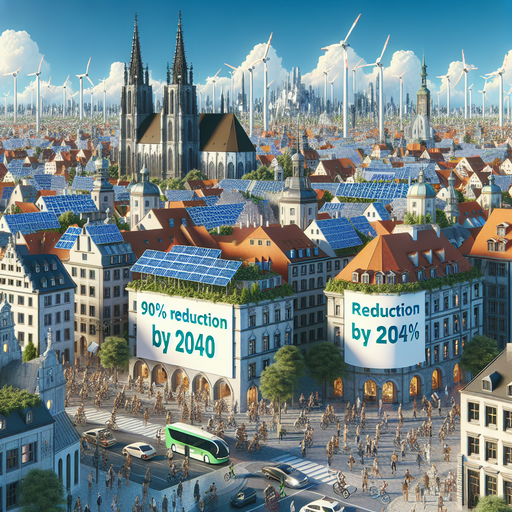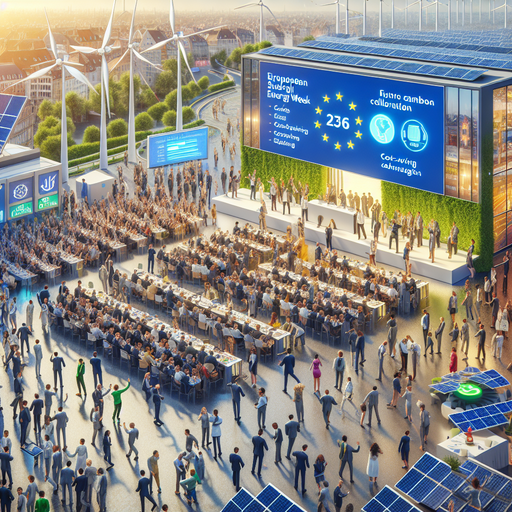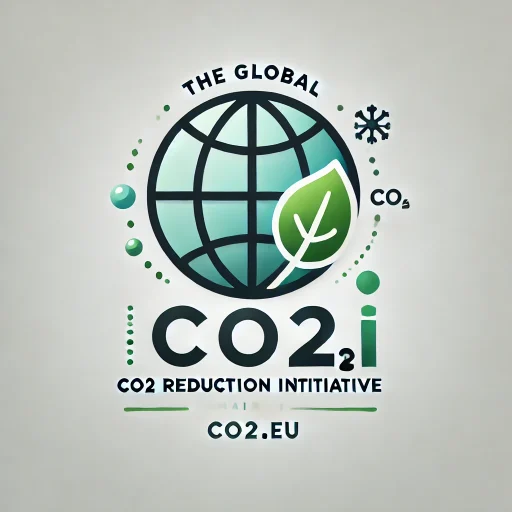
June 30, 2025 to July 06, 2025
Carbon Reduction Activities in Europe: June 30 – July 06, 2025
Executive Summary: The European Union has announced a new climate target to reduce greenhouse gas emissions by 90% by 2040, compared to 1990 levels. This target includes the use of carbon credits, which has sparked debate among environmental groups and policymakers. The EU aims to balance domestic emission reductions with international carbon credits to achieve its climate goals.
Introduction
In the first week of July 2025, the European Union (EU) made significant announcements regarding its climate policy, focusing on carbon reduction activities. These announcements are part of the EU’s broader strategy to achieve climate neutrality by 2050, as outlined in the European Green Deal and the European Climate Law. This report provides a detailed overview of these activities, highlighting key developments and their implications for Europe’s climate action strategy.
New Climate Target for 2040
On July 2, 2025, the European Commission proposed a legally binding climate target to cut net greenhouse gas emissions by 90% by 2040 from 1990 levels. This target is a critical step towards achieving climate neutrality by 2050. The proposal includes the use of carbon credits, allowing member states to meet a limited portion of their emissions offsetting target through credits purchased from developing nations. This flexibility is planned to be phased in from 2036 through a United Nations-backed market, covering up to 3% of the 2040 goal.
Sources: European Commission, The Guardian
Debate on Carbon Credits
The inclusion of carbon credits in the EU’s climate target has sparked debate among environmental groups and policymakers. Critics argue that relying on carbon credits could undermine the credibility of the EU’s target and divert investment away from the EU’s clean tech industry. They emphasize the importance of achieving emission reductions through domestic action. The European Scientific Advisory Board on Climate Change had recommended slightly steeper cuts of 90-95% without the use of carbon offsets.
Sources: World Resources Institute, Down to Earth
Implications for EU Climate Policy
The proposed 2040 climate target is expected to have significant implications for the EU’s climate policy. It will require reforms in energy and climate legislation to align with the new target. The EU’s forthcoming national climate plan, or Nationally Determined Contribution (NDC), will need to reflect this target. The EU aims to demonstrate climate leadership by balancing domestic emission reductions with international carbon credits, while ensuring transparency and preventing emissions leakage.
Sources: World Resources Institute, The Guardian
Conclusion
The announcements made in early July 2025 reflect the EU’s ongoing commitment to reducing carbon emissions and achieving climate neutrality by 2050. By setting a new climate target for 2040 and incorporating carbon credits, the EU is taking significant steps towards a sustainable and competitive low-carbon economy. These initiatives are expected to enhance Europe’s resilience to climate change and support the global effort to mitigate its impacts.

June 23, 2025 to June 29, 2025
Carbon Reduction Activities in Europe: June 23-29, 2025
Executive Summary: During the last week of June 2025, the European Union made significant strides in its carbon reduction efforts. The European Commission adopted the Clean Industrial State Aid Framework (CISAF) to support clean energy investments and decarbonization. Additionally, the EU’s 2040 emissions-reduction target was set at 90% below 1990 levels, with plans to incorporate international carbon credits. These initiatives aim to enhance the EU’s competitiveness and commitment to climate neutrality.
Introduction
Between June 23 and June 29, 2025, the European Union (EU) announced several key initiatives aimed at reducing carbon emissions and advancing its climate goals. These announcements reflect the EU’s ongoing commitment to achieving climate neutrality by 2050 and enhancing its competitiveness in the global clean energy market.
Adoption of the Clean Industrial State Aid Framework (CISAF)
On June 25, 2025, the European Commission adopted the Clean Industrial State Aid Framework (CISAF). This framework is designed to catalyze investment in clean energy and decarbonization by providing substantial subsidies to energy-intensive industries and the clean tech sector. The CISAF aims to make the EU a more attractive destination for clean energy capital and aligns with the EU’s broader geopolitical objectives of achieving strategic autonomy and reducing dependencies on external supply chains.
The CISAF offers increased flexibility for EU Member States to support renewable energy initiatives, decarbonize manufacturing processes, and provide investment aid for clean technology capacity. It emphasizes conditionality, ensuring that state aid is tied to measurable decarbonization outcomes and compliance with EU sustainability standards.
Source: Paul Weiss
EU’s 2040 Emissions-Reduction Target
The European Commission announced its intention to set the EU’s 2040 emissions-reduction target at 90% below 1990 levels. This target is part of the European Climate Law and aligns with the EU’s agenda-setting Competitiveness Compass and the Clean Industrial Deal. The target aims to ensure predictability, boost competitiveness, and position the EU as a leader in developing clean technology.
Despite some opposition, the Commission plans to meet up to 3 percentage points of the new target with international carbon credits. This approach has faced criticism from scientific advisers but aligns with Germany’s position on the 2040 goal.
Source: Politico, Clean Energy Wire
Conclusion
The announcements made between June 23 and June 29, 2025, underscore the EU’s commitment to reducing carbon emissions and achieving climate neutrality. The adoption of the CISAF and the setting of the 2040 emissions-reduction target are significant steps towards these goals. These initiatives are expected to enhance the EU’s competitiveness, attract clean energy investments, and contribute to global climate action.

June 16, 2025 to June 22, 2025
Carbon Reduction Activities in Europe: June 16-22, 2025
Executive Summary: During this period, Europe made significant strides in its carbon reduction efforts, focusing on enhancing policy frameworks and technological advancements. Key initiatives included the revision of the EU Emissions Trading System and the introduction of new carbon capture projects. These efforts are part of the EU’s broader strategy to achieve climate neutrality by 2050.
Introduction
Between June 16 and June 22, 2025, Europe continued to advance its carbon reduction strategies, aligning with the European Union’s commitment to achieving climate neutrality by 2050. This report highlights the key initiatives and policy developments announced during this period, focusing on the transportation and industrial sectors.
Policy Developments
One of the significant policy developments during this period was the revision of the EU Emissions Trading System (ETS). The revised ETS now covers more sectors, aiming to enhance its effectiveness in reducing carbon emissions. Additionally, the introduction of a Carbon Border Adjustment Mechanism was announced. This mechanism is designed to prevent carbon leakage by imposing a carbon levy on imports from countries with less stringent emissions regulations.
Transportation Sector Initiatives
The European Union has been actively working to reduce emissions in the transportation sector, which is a significant contributor to overall greenhouse gas emissions. Recent initiatives include the implementation of stricter emissions standards for vehicles and the promotion of electric and hybrid vehicles. Additionally, investments in public transportation infrastructure are being prioritized to reduce reliance on personal vehicles.
Industrial Sector Initiatives
In the industrial sector, the EU is focusing on decarbonizing energy-intensive industries such as steel, cement, and chemicals. This includes the adoption of cleaner technologies and the implementation of carbon capture and storage (CCS) solutions. The EU is also encouraging industries to adopt circular economy practices to minimize waste and reduce emissions.
Conclusion
The initiatives announced between June 16 and June 22, 2025, reflect Europe’s ongoing commitment to reducing carbon emissions and achieving climate neutrality by 2050. By focusing on key sectors such as transportation and industry, the EU is taking significant steps towards its climate goals. These efforts are supported by robust policy frameworks and international cooperation, ensuring a comprehensive approach to tackling climate change.
Sources

June 09, 2025 to June 15, 2025
Carbon Reduction Activities in Europe: June 2025
Executive Summary: In June 2025, Europe focused on enhancing its carbon reduction strategies through various initiatives. The European Sustainable Energy Week highlighted efforts to boost clean energy, while the EU’s Climate Advisory Board emphasized the need for scaling up carbon dioxide removals. Additionally, the European Commission’s affordable energy action plan aimed to lower energy costs and support decarbonization.
1. European Sustainable Energy Week 2025
The European Sustainable Energy Week took place from June 10 to 12, 2025, in Brussels and online. This event brought together key stakeholders from the clean energy community to discuss and shape Europe’s sustainable energy future. The focus was on the European Commission’s efforts to boost sustainable and affordable energy, particularly through the REPowerEU plan, which aims to diversify energy supplies and increase clean energy production. As a result, 47% of the EU’s electricity now comes from renewable sources. The event also served as a platform to present the affordable energy action plan, which aims to save €45 billion in 2025 by lowering energy costs and attracting investments. Source
2. EU Climate Advisory Board’s Recommendations
On June 11, 2025, the EU’s Climate Advisory Board released a report emphasizing the urgent need to scale up carbon dioxide removals to achieve net-zero emissions by 2050. The report highlighted the decline in the EU’s carbon sink capacity and the slow rollout of new removal methods. It recommended setting separate legal targets for emissions and removals, increasing innovation funding, and integrating permanent removals into the EU Emissions Trading System. The board also suggested recognizing an ‘extended emitter responsibility’ to ensure emitters contribute to future greenhouse gas removals. Source
3. European Commission’s Affordable Energy Action Plan
In June 2025, the European Commission presented its affordable energy action plan, which aims to lower energy costs, complete the energy union, and prepare for potential energy crises. The plan is expected to save €45 billion in 2025, with savings projected to grow in subsequent years. This initiative is part of the Commission’s broader strategy to boost competitiveness and support decarbonization through the Clean Industrial Deal. Source
Conclusion
In summary, the carbon reduction activities announced in Europe during June 2025 reflect a strong commitment to achieving climate neutrality. Through events like the European Sustainable Energy Week and strategic plans such as the affordable energy action plan, Europe is taking significant steps towards reducing carbon emissions and promoting sustainable energy solutions.

June 02, 2025 to June 08, 2025
Carbon Reduction Activities in Europe: June 2025
Executive Summary: Recent developments in Europe’s carbon reduction efforts include the EU’s commitment to linking its Emissions Trading System with the UK’s, enhancing carbon dioxide removal strategies, and simplifying the Common Agricultural Policy to support sustainable practices. These initiatives aim to strengthen Europe’s resilience against climate change and promote a competitive, low-carbon economy.
Introduction
Between June 2, 2025, and June 8, 2025, several significant announcements were made regarding carbon reduction activities in Europe. These initiatives are part of the broader European strategy to achieve climate neutrality by 2050, as outlined in the European Green Deal and the European Climate Law. This report provides a detailed overview of these activities, highlighting key developments and their implications for Europe’s climate action strategy.
EU-UK Emissions Trading Scheme Linkage
On June 2, 2025, it was announced that the European Commission and the UK government have formally agreed to work towards linking their Emissions Trading Systems (ETS). This initiative represents a significant shift in post-Brexit climate policy relations and aims to create a common carbon market. The linkage is expected to enhance the effectiveness of carbon pricing mechanisms and reduce emissions across both regions. Source
Scaling Up Carbon Dioxide Removals
The European Scientific Advisory Board on Climate Change published a report on June 3, 2025, emphasizing the need to scale up carbon dioxide removals. The report outlines recommendations for accelerating the deployment of carbon removal technologies, which are crucial for achieving net-zero emissions by 2050. The focus is on driving innovation, restoring ecosystems, and creating economic opportunities while ensuring environmental and social safeguards. Source
Common Agricultural Policy Simplification
On June 4, 2025, the European Commission announced the simplification of the Common Agricultural Policy (CAP) to support farmers and enhance competitiveness. This initiative aims to promote sustainable agricultural practices and reduce carbon emissions from the agricultural sector. By streamlining regulations, the EU seeks to facilitate the transition to a low-carbon economy and improve the resilience of the agricultural sector to climate change impacts. Source
Conclusion
The announcements made in early June 2025 reflect Europe’s ongoing commitment to reducing carbon emissions and achieving climate neutrality by 2050. By linking the EU and UK ETS, scaling up carbon dioxide removals, and simplifying the CAP, Europe is taking significant steps towards a sustainable and competitive low-carbon economy. These initiatives are expected to enhance Europe’s resilience to climate change and support the global effort to mitigate its impacts.
References

May 26, 2025 to June 01, 2025
Carbon Reduction Activities in Europe: May 26 – June 01, 2025
Executive Summary: During the last week of May 2025, Europe continued to advance its carbon reduction strategies with a focus on innovative policies and international cooperation. Key initiatives were announced to enhance carbon reduction in the transportation and industrial sectors, aligning with the EU’s broader strategy to achieve climate neutrality by 2050. These efforts underscore Europe’s commitment to achieving its climate goals through collaborative and strategic approaches.
Introduction
Between May 26, 2025, and June 01, 2025, Europe announced several initiatives aimed at reducing carbon emissions. These efforts are part of the European Union’s broader strategy to achieve climate neutrality by 2050. The focus during this period was on enhancing carbon reduction strategies in the transportation and industrial sectors.
Transportation Sector Initiatives
The European Union has been actively working to reduce emissions in the transportation sector, which is a significant contributor to overall greenhouse gas emissions. Recent initiatives include the implementation of stricter emissions standards for vehicles and the promotion of electric and hybrid vehicles. Additionally, investments in public transportation infrastructure are being prioritized to reduce reliance on personal vehicles.
Industrial Sector Initiatives
In the industrial sector, the EU is focusing on decarbonizing energy-intensive industries such as steel, cement, and chemicals. This includes the adoption of cleaner technologies and the implementation of carbon capture and storage (CCS) solutions. The EU is also encouraging industries to adopt circular economy practices to minimize waste and reduce emissions.
Policy Developments
Recent policy developments include the revision of the EU Emissions Trading System (ETS) to cover more sectors and the introduction of a Carbon Border Adjustment Mechanism. This mechanism aims to prevent carbon leakage by imposing a carbon levy on imports from countries with less stringent emissions regulations.
Conclusion
The initiatives announced between May 26 and June 01, 2025, reflect Europe’s ongoing commitment to reducing carbon emissions and achieving climate neutrality by 2050. By focusing on key sectors such as transportation and industry, the EU is taking significant steps towards its climate goals. These efforts are supported by robust policy frameworks and international cooperation, ensuring a comprehensive approach to tackling climate change.
Sources

May 19, 2025 to May 25, 2025
Carbon Reduction Activities in Europe: May 19-25, 2025
Executive Summary: The European Union and the United Kingdom have announced a significant collaboration to link their Emissions Trading Schemes (ETS), aiming to enhance carbon reduction efforts across high-emission industries. This initiative is part of a broader strategy to align environmental and economic priorities, including the introduction of the Carbon Border Adjustment Mechanism (CBAM) to level the playing field for domestic companies. Additionally, the EU is preparing for further revisions to its carbon pricing mechanisms to ensure cost-effective and efficient progress towards its climate goals.
Introduction
Between May 19 and May 25, 2025, several key developments in carbon reduction activities were announced in Europe. These initiatives are part of ongoing efforts to meet ambitious climate targets and enhance cooperation between the European Union (EU) and the United Kingdom (UK).
Linking of Emissions Trading Schemes
On May 19, 2025, the UK and the EU announced plans to link their Emissions Trading Schemes (ETS) as part of a broader push for deeper cooperation in reducing emissions across high-polluting industries. This linkage aims to align efforts to support net-zero goals and create a unified carbon market, which is expected to bring economic benefits, lower compliance costs, and reduce trade barriers. The UK ETS, launched in 2021 post-Brexit, will expand to include waste incinerators from 2028. The linkage is seen as a powerful move towards more efficient and cost-effective climate action.
Source: Carbon Herald
Carbon Border Adjustment Mechanism (CBAM)
The new agreement between the UK and the EU will also connect with the EU’s Carbon Border Adjustment Mechanism (CBAM), set to begin on January 1, 2026. The UK plans to implement its own CBAM a year later. This mechanism is intended to level the playing field for domestic companies facing international competition. Aligning with the EU CBAM could save UK exporters around $1 billion (£800 million) in its first year. Swift action to secure mutual exemptions from respective CBAM schemes is considered vital to reduce trade frictions before the EU’s mechanism comes into force.
Source: Carbon Herald
Upcoming Revisions to EU Carbon Pricing
In addition to the ETS linkage, the European Commission is preparing for a review of the EU ETS slated for 2026. This includes launching a Call for Evidence and a public consultation to gather stakeholder input. The EU is also contemplating further revisions to the CBAM and announced an Industrial Decarbonisation Accelerator Act for Q4 2025. These measures are expected to have regulatory and operational implications for EU and non-EU companies, aiming to ensure that the EU ETS contributes to the EU’s goal of carbon neutrality by 2050 as cost-effectively and efficiently as possible.
Source: JD Supra
Conclusion
The announcements made between May 19 and May 25, 2025, highlight significant steps towards enhancing carbon reduction efforts in Europe. The linkage of the UK and EU ETS, along with the introduction of the CBAM and upcoming revisions to carbon pricing mechanisms, demonstrate a strong commitment to achieving climate goals through collaborative and innovative approaches.

May 12, 2025 to May 18, 2025
Carbon Reduction Activities in Europe: May 12-18, 2025
Executive Summary: Recent developments in Europe’s carbon reduction efforts highlight a strategic shift towards more flexible regulatory frameworks and increased support for carbon dioxide removal technologies. The European Union is actively working to balance environmental goals with economic competitiveness, particularly in the automotive sector. Additionally, new initiatives are being introduced to enhance carbon farming and carbon removal certifications, aiming to foster innovation and investment in sustainable practices.
Introduction
Between May 12 and May 18, 2025, several significant developments in carbon reduction activities were announced in Europe. These initiatives are part of the broader European Green Deal and Fit for 55 package, aiming to achieve net-zero emissions by 2050. This report provides a detailed overview of the key announcements and their implications for Europe’s decarbonization strategy.
Flexibility Measures for Carmakers
On May 12, 2025, the European Parliament adopted new flexibility measures for CO2 emission performance standards for new cars and vans. These measures allow manufacturers to average their emissions performance over a three-year period (2025-2027) rather than annually. This approach is designed to support the automotive sector amidst rapid technological changes and increasing global competition. The proposal is part of the European Commission’s industrial action plan for the automotive sector, which aims to reduce average CO2 emissions by 15% compared to 2021 values for the 2025-2029 period. (Source)
EU Decarbonization Policy Adjustments
Recent discussions have highlighted the need for a balanced approach to the EU’s ambitious decarbonization policies. The European Commission’s “Clean Industrial Deal,” published in February 2025, sets a 90% emissions reduction target by 2040. However, there is recognition that some regulations may impose significant financial and administrative burdens on industries, potentially affecting competitiveness. As a result, the EU is considering modifications to existing decarbonization tools to ensure they align with economic growth and competitiveness goals. (Source)
Carbon Dioxide Removal and Carbon Farming
The EU’s Climate Advisory Board has emphasized the importance of scaling up carbon dioxide removals alongside deep emissions cuts. The board recommends setting separate legal targets for emissions and removals, which would provide clear investment signals and promote technological progress. Additionally, the EU is advancing the Carbon Removals and Carbon Farming Regulation (CRCF), which aims to create a trusted system for certifying high-quality carbon credits. This regulation is expected to unlock new funding opportunities through voluntary markets and public-private incentives, particularly benefiting farmers through sustainable practices. (Source, Source)
Conclusion
The recent announcements between May 12 and May 18, 2025, reflect Europe’s ongoing commitment to achieving its climate goals while addressing the challenges of economic competitiveness and technological innovation. By introducing flexibility measures, adjusting decarbonization policies, and promoting carbon removal technologies, the EU is taking significant steps towards a sustainable and resilient future.

May 05, 2025 to May 11, 2025
Carbon Reduction Activities in Europe: May 2025
Executive Summary: Recent developments in Europe’s carbon reduction strategies highlight a significant focus on enhancing carbon dioxide removal capabilities and supporting the automotive sector’s transition to lower emissions. The European Union is advancing its regulatory framework to ensure robust carbon removal certification and is providing flexibility measures for car manufacturers to meet emission targets. These initiatives are part of a broader effort to achieve climate neutrality by 2050.
Introduction
Between May 5, 2025, and May 11, 2025, several key initiatives and regulatory updates were announced in Europe, focusing on carbon reduction and climate action. These developments are part of the European Union’s ongoing efforts to meet its climate targets and support the transition to a low-carbon economy.
Carbon Dioxide Removal Certification Framework
The European Union has introduced a new Carbon Removal Certification Framework aimed at standardizing carbon removal activities across the region. This framework, established under Regulation (EU) 2024/3012, seeks to enhance the credibility and transparency of carbon removal efforts, supporting the EU’s climate neutrality goals by 2050. The framework targets three primary activities: geological storage of CO2, carbon farming, and carbon storage in products. Certification under this framework is voluntary and requires compliance with quality criteria, which will be verified by independent third parties. The regulation aims to prevent greenwashing and ensure environmental integrity in carbon removal processes.
Source: Jones Day
Flexibility Measures for Car Manufacturers
The European Parliament has adopted flexibility measures for car manufacturers to help them meet CO2 emission targets. The new regulation allows manufacturers to average their emissions performance over a three-year period (2025-2027) rather than being assessed annually. This approach provides carmakers with the flexibility to balance excess emissions in one year by outperforming in subsequent years. The measure is intended to support the automotive sector, which is facing rapid technological changes and increased competition.
Source: European Parliament News
Scaling Up Carbon Dioxide Removals
The European Scientific Advisory Board on Climate Change has released a report emphasizing the need to scale up carbon dioxide removals alongside deep emissions cuts. The report recommends setting separate legal targets for emissions and removals, increasing innovation funding, and ensuring robust monitoring to manage risks. The Advisory Board also suggests integrating permanent removals into the EU Emissions Trading System and recognizing an ‘extended emitter responsibility’ to contribute to future greenhouse gas removals.
Source: EU Climate Advisory Board
Conclusion
The recent announcements in Europe reflect a comprehensive approach to carbon reduction, focusing on both regulatory frameworks and industry support. By enhancing carbon removal capabilities and providing flexibility to the automotive sector, the EU aims to accelerate its transition to a sustainable and competitive low-carbon economy.

April 28, 2025 to May 04, 2025
Carbon Reduction Activities in Europe: April 28, 2025 – May 04, 2025
Executive Summary: Europe continues to advance its carbon reduction strategies with a focus on innovative policies and international cooperation. Recent initiatives highlight the region’s commitment to achieving climate goals, particularly in the transportation and industrial sectors. These efforts are part of the broader strategy to achieve climate neutrality by 2050.
Introduction
Between April 28, 2025, and May 04, 2025, Europe announced several initiatives aimed at reducing carbon emissions. These efforts are part of the European Union’s broader strategy to achieve climate neutrality by 2050. The focus during this period was on enhancing carbon reduction strategies in the transportation and industrial sectors.
Transportation Sector Initiatives
The European Union continued to implement stringent regulations and innovative technologies to reduce emissions in the transportation sector. This includes the introduction of new standards and incentives to promote the use of low-emission vehicles and the development of infrastructure to support electric and hydrogen-powered transportation.
Industrial Sector Policies
In the industrial sector, the EU is focusing on decarbonization through the Clean Industrial Deal, which outlines actions to lower energy prices, create quality jobs, and promote sustainable production. The Deal emphasizes circularity, aiming to reduce waste and extend the life of materials by promoting recycling and reuse.
Integration of Carbon Removals
Germany’s coalition agreement emphasized the integration of carbon removals and international credits into climate targets. This approach allows countries to incorporate international carbon credits into their climate efforts, supporting the EU’s overarching Climate Law and the Emissions Trading System.
Conclusion
Europe’s recent carbon reduction activities highlight a strong commitment to achieving climate goals through innovative policies and international cooperation. The focus on transportation and industrial sectors, along with strategic use of carbon credits, underscores the region’s proactive approach to addressing climate change.
